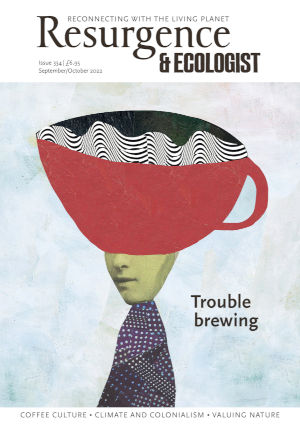The dominant story of modern civilisation is the story of separation. From the point of view of materialist economics and mechanistic science, Nature is merely a machine and the Earth is just a dead rock. Nature is assumed to be inanimate and simply a resource for the economy: a resource for production, consumption and economic growth. From this perspective humans and Nature are seen as totally separate. Moreover, humans are considered to be above Nature and superior to Nature. The value of Nature is measured only in terms of its usefulness to humans. At best it is labelled ‘eco-system services’!
It is the prevalent story of separation and dualism.
But fortunately, a new story is emerging. This is the story of Gaia, a science that asserts that Nature is not a machine, and the Earth is not a dead rock. Rather, Nature is vibrant, vital and alive. Gaia, the Earth, is a living organism, conscious, intelligent and animate. This is the science of quality and meaning, which sits alongside the science of quantity and measurement.
Parallel to this holistic approach in science a new story is emerging in philosophy. This is the story of Deep Ecology. According to this story Nature has intrinsic value, irrespective of her usefulness. For example, trees are good not because they produce nuts and fruit, generate oxygen and sequestrate carbon, but in themselves, as integral parts of anima mundi, the living world.
In addition, a new story is emerging in economics. This is the story of Regenerative Economics. In this perspective the linear economics of take, use and throw away, causing waste, pollution and global heating, is replaced by circular economics. Whatever comes from Nature must go back to Nature. This new economics uses the metaphor of a doughnut, working within the limits of the ecosystem and ensuring economic justice and social harmony for people.
From this perspective humankind must uphold the rights of Nature and the Earth, as well as the rights of humans. Rivers have the right to remain pure and free of contamination from sewage. Oceans have the right to be free of plastic pollution. Nature and people have the right to live their lives in freedom and equity.
This new story is the story of the unity of life. It recognises implicit and explicit relationships among all living beings. We are all integral to the intricate web of life, rather than just an assembly of distinct parts or separate entities. Mutuality, reciprocity and connectivity are the fundamental principles of existence.
In this story humans and Nature inter-are. Mind and matter, spirit and body are neither separate nor opposed to each other. Without spirit the body is useless, and without the body spirit is useless. One cannot exist without the other. They are dancing together. As dance and dancer cannot be separated, neither can mind and matter, body and spirit, nor Nature and humans be separated.
The story of separation is also the cause of war, poverty, racism and inequality. First we create separation and division between Nature and humans, and then we create separation and division between people and people in the name of nationalism, religion, politics, race or gender. Evolution creates and celebrates diversity within the unity of life, but the dominant story of separation creates divisions and conflicts suppressing the eternal truth of interdependence.
Unity is not uniformity. Unity is implicit in diversity. Diversity is not division. We love and celebrate diversity and heal all divisions.
The upholders of the old story are seeking solutions to every problem through technology. Technology is their saviour, their religion and their refuge. They seek sources of unlimited energy while claiming to reduce their dependence on oil, gas and coal. One way or another they wish to continue to pursue their policy of unlimited economic growth without changing their story, their worldview, their paradigm and their values. For them Nature continues to remain a resource for the economy.
Of course technology has a place. But new technology, in upholding and maintaining the story of separation, will lead to new problems. New technology needs to be developed alongside a new story to create a new paradigm, a new worldview with new values that celebrate diversity within unity.
In the story of separation, Nature and humans are merely means to an end: economic growth. The end goal is ever-increasing production and consumption in the interest of the bottom line, which must show profit on the balance sheet. Whether production, consumption and financial profit are serving any useful purpose is beside the point. The industrial machine must be kept turning and it must keep churning out products for the market. Whether people need those products is completely irrelevant. They must keep buying them to sustain the market and to keep the economy growing. Huge sums are spent on advertising to generate unnecessary desires and temptations.
Increasing numbers of people are realising the futility and unsustainability of this story of separation.
In the emerging new story of unity, the wellbeing of people and planet Earth are the end, and the production, consumption and the economy are the means to that end. The end goal is to achieve planetary wellbeing. Production should not be for the market: production should be only to meet the genuine needs of people within the limits of the regenerative capacity of the Earth. Need-based products should be designed in such a way that they produce zero waste and minimum pollution. In this story people will find happiness and fulfilment through family and friendship, through culture and creativity, through wonder and amazement, and through practising elegant simplicity.
So let us move from the story of separation to the story of unity, and let us celebrate diversity on every level: biodiversity, cultural diversity, religious diversity, political diversity and truth diversity.







